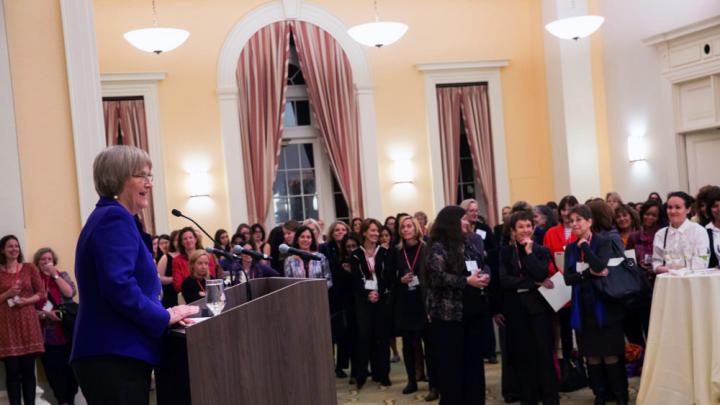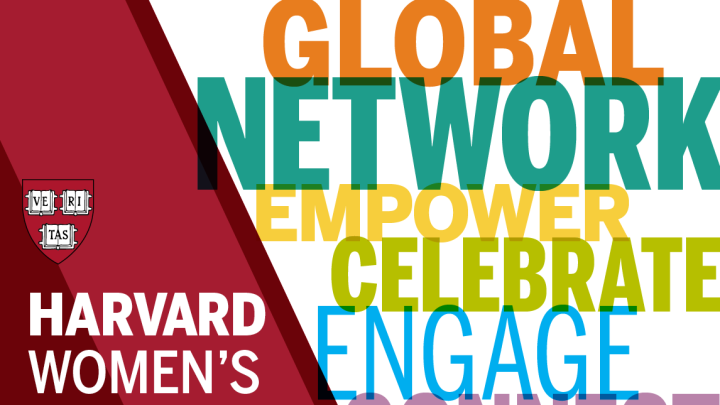more than 400 alumnae and friends gathered this past weekend for Harvard’s first University-wide Women’s Weekend, a three-day networking and learning event for Harvard and Radcliffe alumnae. Organized by the Harvard Alumni Association (HAA), the weekend featured dozens of events on subjects of interest to women, including race, sexuality, and work-life issues. A panel on Friday afternoon discussed women in sports and representations of female athletes in the media, touching on last week’s news reports that Harvard men’s athletic teams had produced sexually explicit documents about their own sport’s women’s team.
Following that panel, University president Drew Faust greeted the alumnae at a reception in Harvard Business School’s grand Spangler Center, over wine and elegant Mediterranean hors d’oeuvres. The mood in the room then quickly turned more pensive. “It’s truly a pleasure to be here tonight to celebrate the women of Harvard and Radcliffe,” Faust said in her opening remarks. Then, pivoting to the past as she is wont to do, the Lincoln professor of history continued:
But it’s also easy to forget how we got here...In the words of my predecessor Charles William Eliot, “We know nothing of the mental capacities of women”...At Radcliffe Commencement, President Eliot questioned whether, as he put it, “women had the originality and pioneering spirit which equip them to be leaders.” Then, he went to a Wellesley inauguration...and there he chose to wonder aloud about whether the higher education of women had any point, or was as profitable to society as the higher education of men.
“Clearly, a diplomat,” she quipped, to a room of roaring laughter.
“Your presence here tonight,” Faust said, beaming, “this uplifting force of nearly 150,000 Harvard and Radcliffe alumnae across the globe, was once unimaginable, just as students today can hardly believe—and I think many of them don’t believe—that when I was in college I was not allowed to wear pants to class. I would not have been able to apply to Princeton or Yale, or get a credit card without a male co-signer. This is a world they struggle to imagine. Nor could they imagine a universe in which Widener Library until 1949 restricted Radcliffe students, literally, to a room of their own, which was hardly big enough to hold a table and a volume of Virginia Woolf. For years, the female graduate students who were allowed to use the main reading room and its tables were not, however, allowed to sit down at those tables…[I]n the 1950s, a Widener librarian once received a formal complaint”—and Faust recited, with feigned horror, “‘There was a woman here, and she sat down.’”
She recalled the stories of distinguished women at Harvard—and of those who were shut out of Harvard. “Who can forget Pauli Murray,” she asked, “denied admission to Harvard Law School in 1944 not because she was black, but because she was female. She fought fiercely and lost…She not only contributed the litigation strategy in Brown v. Board of Education—she became a driving force behind adding sex discrimination in the 1964 Civil Rights Act, linking civil rights and women’s rights and human rights.
“The category of ‘woman’ itself has been challenged and expanded to include a broader diversity of representation of race, ethnicity, sexuality...And think, too, of our transgender students, who are insisting that we confront even broader categories of identities,” Faust continued, pushing on to the distance that remains to be traveled. “Looking out at this room tonight, I see a lot to tell President Eliot.”
On Saturday morning, Raine Figueroa ’84, M.B.A. ’91, the last president of what was founded as the Harvard Annex Alumnae Association in 1887 and current vice president of Alumnae and Friends of Radcliffe College, stepped to a lectern in the Science Center to celebrate the first University-wide Women’s Weekend. “It’s nice to see we’re finally settling in as part of Harvard,” she said matter-of-factly—and added her hope that the discussions started during the weekend would be just the beginning of conversations and dialogues “that will grow exponentially.”
The two sessions that followed, before attendees separated into discussion groups, introduced a rising faculty star and four impressive students.
Sarah Lewis ’01, assistant professor of history of art and architecture and of African and African American studies, used the “opening conversation” with vice president for alumni affairs and development Tamara Elliott Rogers ’84 to talk in part about one of her courses, “Vision and Justice: The Art of Citizenship.” Its focus on the relationship of art, justice, and African American culture from the nineteenth century to the present represents newer courses in the College with an interdisciplinary, hands-on approach. An installation now on view in the University Teaching Gallery of the Harvard Art Museums includes contributions by students from the course. Lewis also shared a pedagogical tip. Alluding to her 2014 book The Rise: Creativity, the Gift of Failure, and the Search for Mastery, she said she offers students their own “gift of failure”: the course requires both a paper and an exam, but the lower grade is thrown out. In practice, she reported, this has prompted students to explore unusual and challenging topics in their papers, with some extraordinary results.
Younger professors such as Lewis, said senior Osaremen Okolo a short while later, are very helpful in introducing new perspectives in their disciplines to students, and in their very presence as faculty members. Okolo, together with her classmate Stephanie Deccy, Ph.D. candidate Alexandra Feldberg, and master of divinity candidate Sahar Shahid, composed a panel offering student views on “What’s Happening at Harvard.” They spoke primarily about different kinds of diversity on campus, drawing from their own perspectives and passions. Deccy has explored the range of undergraduate attitudes toward mental-health issues, hoping to destigmatize reaching out for help. Okolo praised the diversity of political thought she’s encountered, but worried, she said, that her more conservative friends don’t feel as welcome. Shahad spoke of special events organized by ethnic, regional, and religious student groups that provide an immersion in one’s own heritage (including sometimes divisive issues within), and introductions to others’. Feldberg seconded that, citing the sheer diversity in backgrounds—including national, economic, and social—of her fellow students and other people she’s met at the University.
Okolo and Shahid, in particular, also highlighted the complexities involved in addressing issues of diversity and inclusion, safe spaces and political correctness, including comments on the new policy regarding membership in single-sex organizations not officially recognized by the College. Okolo suggested that women’s groups affected by the ban differed in significant ways from some of the men’s groups targeted; she also questioned the policy’s focus given recent news reports on some Harvard’s men’s sports teams. Shahad also called the focus on single-sex groups too narrow. She turned to what she called the “tokenization” of interfaith dialogue, asserting that there is too much focus on religious groups’ similarities, and not enough on how faiths differ, and what those differences—including intrafaith differences—mean. How, she asked, do we educate one another while also recognizing that personal feelings are involved. Sometimes, she added, confrontation can be a moment of clarity that leads to solving problems, which is better than letting matters deteriorate in ambiguity. Okolo later proposed that “safe spaces” can be useful when the people within them go out and share what they’ve learned with others.
The weekend’s themes, emblazoned on handouts and programs, were “GLOBAL, CELEBRATE, EMPOWER, NETWORK, ENGAGE, CONNECT,” and Saturday’s pre- and post-luncheon panel and workshop sessions—some developed with HAA Shared Interest Groups (SIGs)—complied across a broad range of topics.
- Participants could learn about “The Global Landscape: International Women’s Issues” and “Raising and Teaching Girls in America: Then and Now” (which promised strategies for helping girls become “influential and confident women”). Meanwhile, the Harvard Alumni for Global Women’s Empowerment SIG organized a session on “Girls’ Education as a Pathway to Global Women’s Empowerment.”
- A macro look at “Women’s Health in America” could be paired with “Exercise the Six Dimensions of Wellness” (with guidance on “organizing a personal support network for wellness, and about cultivating hope”).
- Those interested in women in entrepreneurship, or advancing gender equality in the STEM fields, could move on to an afternoon discussion group organized by Harvard Women in Defense, Diplomacy, and Development that offered a “discussion of best practices on how to effectively build a trusted network across the 3Ds.”
- Furthering networks was a component of “Harvard Women of Color: Conversation, Connection, Community, Change” (organized jointly by the Harvard Asian American Alumni Alliance, Harvard Black Alumni Society, and Harvard Latino Alumni Alliance) and “The Evolution of the LGBTQ Landscape” (a collaboration between Harvard Medical School’s LGBT Office and the Harvard Gender and Sexuality Caucus).
- “Memo to the President Elect: Key Issues Following the 2016 Election” nodded to the big event just three days away, while sessions on “Beyond Balance: Challenges and Choices in the 21st Century” and “Work/Family Balance: Unattainable Standard?” (the latter organized by the Alumnae-i Network for Harvard Women) addressed ubiquitous realities facing women and men.
That awareness of inclusivity, coupled with attendees’ enthusiasm and acknowledgment of the complexity—and often competing goods—involved in the topics under discussion, may augur well for Figueroa’s long-term hope.









